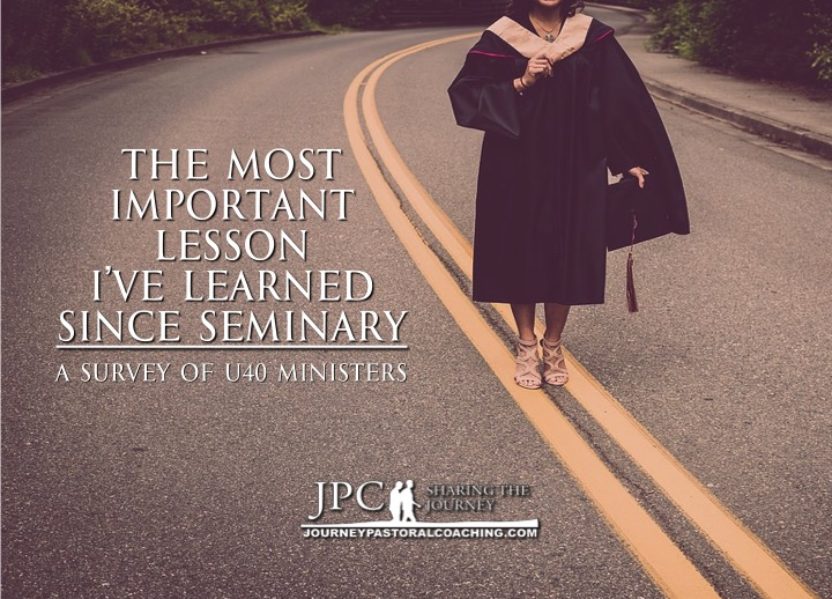U40 Ministers Tell Us What They’ve Learned Since Seminary
We recently asked the members of Journey this question:
“What is the greatest MINISTRY lesson you’ve learned since leaving your theological / ministry training school?”
Their answers are not only enlightening but in some cases surprising. In side comments, several wrote that while they had intellectually “learned” a particular lesson in Bible College or seminary, they have since “experienced” this lesson and grown wiser for it since being in the ministry. They said this question does not so much identify what Bible College or seminary didn’t teach them. Neither does it identify what they “failed” to learn in school. It’s really about how the learning kicks into gear once we leave the classroom and enter our places of service.
If you’re currently in ministry training, have been in ministry for a few years, or even if you’ve been in ministry for many years, here’s a great refresher on the lessons we never want to stop learning as we serve the King of Kings in His high calling.
Every respondent was permitted to offer one lesson learned. Here’s what they told us:
- God is the only person who gets to define success in ministry.
- As a Youth Pastor, I learned that I needed to not just be a pastor to the students, but a pastor to parents.
- Ministry is a lot less about teaching people the Bible and a lot more of living life with people and creating community for them to grow and live out what they know and have learned from the Bible.
- Dependence on God in ministry.
- Ministry is hard work. Ministry is not simply your call, but also your dedication and determination not to give up on that call.
- How to minister to people who hurt you without carrying a grudge or chip on your shoulder. I suppose a better way to say it is how to forgive a person in a way that you can continue to minister to them regardless of what happened in the past.
- Completing degrees does not mean we can stop learning. In fact, completing degrees ultimately only help us become better learners; their best and primary function is to help us learn more, faster.
- You can’t let go of relationships with people who are passionate about their call. The networks, and relationships you sustain with people from college will prove worth their weight in gold. These are the people who will encourage and pray for you with power.
- Pastoring people is harder than I ever thought it would be. It’s driven me deeper into God and into myself than I ever imagined.
- Don’t compare my success/growth/ministry with anyone else. This lesson is so vital to any ministry.
- How important it is to be a voracious, seeking, searching, reading, conversing, digging, driving life-long learner – of who God is, how He works in the world, how to minister for Him. No learning means no hunger; no hunger means death to me and those I lead.
- Preaching from a manuscript.
- The irreplaceable value of living in and drawing my life from daily spiritual disciplines like studying God’s Word, prayer, fasting, solitude, simplicity.
- Ministry isn’t as cut and paste as it seems in textbooks. There is no magic formula for success in ministry.
- Ministry involves much more than Bible Study, Homiletics, and performing Sunday services.
- Practical ministry with people is a lot more nuanced and complicated than a textbook can answer
- Your personal relationship with God is far more important to ministry than any skills you can develop.
- Pastors are fallen people, too. Bible College and seminary didn’t teach me about how much my own personal development would need to be a part of my life. There was an unwritten assumption that personal development would just happen.
- In school you learn general principles and good practices for walking with people, but there is no substitute for hands-on experience. Every person is different, requiring a unique approach to walk with and minister to as the Holy Spirit leads.
- Ministry can be a lonely world. You must seek out people to walk with you.
- It is better to embrace the ministry God has called you to instead of trying to force it to be the type of ministry you thought you would lead in college.
- Ministry is not the accumulation and use of skills and techniques. It flows from who God is and who I am in Him. Only then do my skills and learning techniques count.
- Learning styles and group processes for discipleship in ministry. I have learned new ways and approaches that are more holistic, relationally rich and bring more joy into the process.
- Obedience to God is more important to ministry than any ability, skill, or gift.
- I didn’t know as much as I thought I did and I don’t know as much as I think I do. When it comes to ministry, I’m learning humility is far more powerful than any skills I have because when I am humble, God enters my ministry.
- What it means to surrender to God and submit to him in all that you do. To trust in him and have faith in him as a leader in a ministry position.
- Ministry is not a substitute for a personal relationship with God
- Loving and serving the people we minister to is wayyyyyy more important than always having the “right answers” to theological/biblical questions, preaching, playing music excellently.
- How important it is to study, know, breathe, meditate on, live and teach the Word of God. It is the Word of God that is powerful in people’s lives. I have to know it, live it, and give it.
- Take time for Sabbath and rest.
- Ministry is not glamorous: it’s hard, messy and not always enjoyable. Working with people is awesome, but can be very difficult.
- Don’t despise the day of small beginnings in ministry.
- There is a major difference between theory and actual practice. I think in Bible College I gained a lot of knowledge that is very helpful. However, the reality of living out what I learned has added to my understanding of the knowledge I gained.
- Longevity means more than I ever expected. I got to see it first hand after 6 years of being a youth pastor. Relationships with those families run deep after that amount of time. It also blessed the teenagers to have a youth pastor for that long.
- Perseverance, whatever the results. In the midst of the success and the less than stellar experiences, the small gems I’ve gathered along the way have been priceless. I don’t know if it will ever get “easier,” but I’ll take following God to death if that’s what it means.
- Everyone needs a pastor/mentor/shepherd/adviser. We must pastor the one (individual) before we pastor the many (crowd).
- That everything is grace: my salvation, my walk with God, my self-worth, my ministry, any results. Everything.
- Ministry is not determined or defined by a position, it’s a true calling from God regardless of position or no position.
- How much I love and need the presence of God not only in my life, but in my ministry.
THE GREAT CLOUD OF WITNESSES
In closing, nine experienced ministers of history offer their answers to the question:
“Pay attention to what I tell you: whoever you may be, always have God before your eyes; whatever you do, do it according to the testimony of the holy Scriptures; in whatever place you live, do not easily leave it. Keep these three precepts and you will be saved.” St. Antony of Egypt
“Do all the good you can,
By all the means you can,
In all the ways you can,
In all the places you can,
At all the times you can,
To all the people you can,
As long as you ever can.” John Wesley
“But the question to precede all others, which finally determines the course of our lives is: ‘What do I really want? Was it to love what God commands, in the words of the collect, and to desire what He promises? Did I want what I wanted, or did I want what He wanted, no matter what it might cost?'” Elisabeth Elliot
“Everything begins with loving God. Either we love the one we serve, or our service will become arduous and boring work. Don’t work for the Church of God; serve the God of church.” José Luis Navajo
“The two questions that all servants of Christ need to ask themselves are: ‘What do I want to be known for at the end of my life?’ and ‘How can I finish well?’ The secret to finishing well is to abide in Christ and to submit to his pruning, no matter how painful. Fruitfulness is not the result of what we do, but the outcome of who we are.” Eddie Gibbs
“The end of all learning is to know God, and out of that knowledge to love and imitate Him.” John Milton
“Although I have much to be grateful for as I look back over my life, I also have many regrets. I have failed many times, and I would do many things differently . . . I would give more attention to fellowship with other Christians, who could teach me and encourage me and even rebuke me when necessary.” Billy Graham
“If we define all that we are before our great Caller and live our lives before one audience – the Audience of One – then we cannot define or decide our own achievements and our own success. It is not for us to spell out what we have accomplished. It is not for us to pronounce ourselves successful. It is not for us to spell out what our legacy has been. Indeed it is not even for us to know. Only the Caller can say. Only the Last Day will tell. Only the final ‘Well Done’ will show us what we have really done.” Os Guinness
“The beginning of wisdom is this: Get wisdom, and whatever you get, get insight.” Proverbs 4.7
—————
NOTE: Journey Pastoral Coaching provides pastoral coaching to Millennial ministers.
Saddled with large student debt, just beginning to set up homes and start families, and serving in low paying first and second positions, Millennials are those who most desire but can least afford to pay for pastoral coaching.
So we offer it to them at NO COST: Our members do not PAY for coaching; they EARN it.
We are able to do so through the faithful and generous gifts of friends who want to see young leaders not only enter the ministry, but remain in the ministry. If you or your church would like to help Millennial ministers in 21 US states and 5 nations build strong for a lifetime in ministry, please click here to contact us by email or to support Journey monthly or with your one-time gift. Thank you.
We also invite you to click and subscribe to our twice-monthly blogs at journeypastoralcoaching.com
“In the early years when I was becoming a pastor, I needed a pastor.”
Eugene H. Peterson, The Pastor: A Memoir



